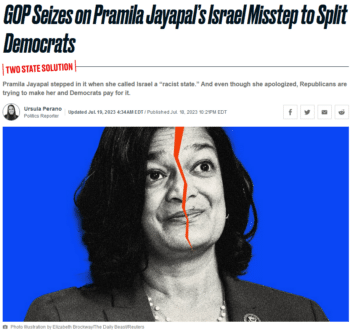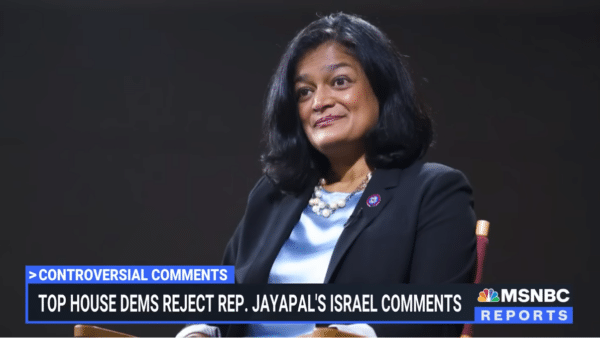
Media coverage mainly focused on the politics of calling Israel a “racist state” (Daily Beast, 7/19/23) rather than on the question of whether Israel was racist.
When Rep. Pramila Jayapal (D.—Wash.) called Israel a “racist state” at the Netroots Nation conference, corporate media dutifully covered the political backlash—but scrupulously avoided evaluating the veracity of Jayapal’s statement.
Addressing activists who interrupted a panel to protest panelist Rep. Jan Schakowsky’s refusal to support a bill protecting Palestinian children, Jayapal said:
As somebody that’s been in the streets and has participated in a lot of demonstrations, I think I want you to know that we have been fighting to make it clear that Israel is a racist state, that the Palestinian people deserve self-determination and autonomy, that the dream of a two-state solution is slipping away from us, that it does not even feel possible.
Republicans immediately jumped on the statement, working to cast the Democratic party as antisemitic for as many news cycles as possible (Daily Beast, 7/19/23). Top Democrats swiftly rebuked Jayapal, distancing themselves from her remarks and declaring that “Israel is not a racist state.”
Jayapal offered a lengthy apology, explaining, “I do not believe the idea of Israel as a nation is racist,” but rather that
Netanyahu’s extreme right-wing government has engaged in discriminatory and outright racist policies and that there are extreme racists driving that policy within the leadership of the current government.
Reporting the push-back

A Washington Post article (7/17/23) quoted no one but U.S. officials, making claims about Israel that many human rights experts would dispute.
Most major U.S. news outlets covered the blowup over Jayapal’s statement. But astonishingly few took the obvious and necessary journalistic step of factchecking it.
NPR (7/17/23) discussed the events under the headline, “Top House Democrats Reject Rep. Jayapal’s Comments Calling Israel a ‘Racist State.’” CNN (7/16/23) went with “Top House Democrats Rebuke Jayapal Comments That Israel Is a ‘Racist State’ as She Tries to Walk Them Back.” The Washington Post‘s version (7/17/23) ran under the headline, “Democrats Push Back on Rep. Jayapal’s Description of Israel as ‘Racist State.’”
NPR characterized her words as “controversial.” The Post and CNN quoted top Democrats calling the remarks “unacceptable,” and CNN added a quote from Rep. Debbie Wasserman Schultz calling them “hurtful and harmful…wholly inaccurate and insensitive.”
Both NPR and CNN briefly mentioned that progressive Democrats have “concerns” about “human rights” in Israel, but offered no further information about them.
‘System of domination’
But, of course, progressive Democrats aren’t the only ones with concerns about human rights or racism in Israel, and Jayapal didn’t come up with the “racist state” characterization out of thin air.
In 2021, Human Rights Watch (4/27/21) published a lengthy report spelling out its determination that Israel had committed crimes of apartheid against Palestinians, which is defined under international law as
an intent to maintain a system of domination by one racial group over another; systematic oppression by one racial group over another; and one or more inhumane acts, as defined, carried out on a widespread or systematic basis pursuant to those policies.

Human rights groups like Amnesty International (2/22) have condemned Israel’s apartheid system, which Amnesty defines as a “system of prolonged and cruel discriminatory treatment by one racial group of members of another with the intention to control the second racial group.”
HRW explained, for those inclined to split hairs, that this applies to Palestinians because under international law, “race and racial discrimination have been broadly interpreted to include distinctions based on descent, and national or ethnic origin, among other categories.”
Earlier the same year, Israeli human rights group B’Tselem (1/12/21) released a report declaring Israel an “apartheid regime.”
Amnesty International (2/1/22) followed the next year, publishing a 280-page report titled “Israel’s Apartheid Against Palestinians” that declared that
Amnesty International concludes that the State of Israel considers and treats Palestinians as an inferior non-Jewish racial group.
These reports came about after Israel in 2018 passed a law with constitutional status that declares Israel is the “nation-state of the Jewish people,” and that “the right of national self-determination in the state of Israel is unique to the Jewish people”—in other words, that Israel is not a nation-state for its Palestinian residents, whether accorded citizenship or not, and that Palestinians subject to Israel’s control have no right to self-determination.
As B’Tselem explained in its report:
It is true that the Israeli regime largely followed these principles before. Yet Jewish supremacy has now been enshrined in basic law, making it a binding constitutional principle—unlike ordinary law or practices by authorities, which can be challenged. This signals to all state institutions that they not only can, but must, promote Jewish supremacy in the entire area under Israeli control.
Jayapal’s statement, therefore, that Israel is a “racist state” has clear grounding in international law, as multiple respected human rights organizations have documented.
‘Certain subjects are taboo’
But in the flood of coverage, mentions of any of the human rights organizations that have designated Israel an apartheid state were extremely rare—and only came after Palestinian-American Rep. Rashida Tlaib (D.—Mich.) highlighted them in a speech on the House floor against a House resolution declaring Israel “not a racist or apartheid state.” At publication, a Nexis search of U.S. news sources found 474 articles and transcripts since July 15 that mentioned Jayapal and “racist state.” Only 24 of those mentioned Amnesty International, Human Rights Watch or B’Tselem.

Washington Post columnist Ishaan Tharoor (7/19/23) was one of the few commentators who cited Human Rights Watch and Amnesty International‘s positions on Israel. But even he softened their critique, writing that they saw Israeli discrimination against Palestinians “as akin to apartheid.”
The New York Times (7/18/23) quoted Tlaib saying, “Israel is an apartheid state,” and noted that in her speech she cited “determinations from United Nations officials, Human Rights Watch, Amnesty International and the Israeli human rights organization B’Tselem that Israel’s treatment of Palestinians amounted to apartheid.” This was followed with three sources calling the “racist state” characterization “contrary to the facts,” “false” and “hateful.”
The Hill (7/18/23) offered a brief article about Tlaib’s comments, and the Washington Post‘s follow-up article (7/18/23) mentioned them as well.
Opinion columns in Newsweek and the Post were noteworthy standouts. Both noted the human rights organizations’ designations and explored the political context beyond the current theatrics. Ishaan Tharoor’s Post column (7/19/23), headlined “It’s the Republicans, Not the Democrats, Who Are Radical on Israel,” focused on the contradictions of growing U.S. public support for Palestinians as the GOP moves radically rightward on Israel/Palestine foreign policy.
The Newsweek column (7/18/23), by Omar Baddar, offered the only forceful defense of Jayapal’s remarks FAIR could find in establishment media. Under the headline “Rep. Jayapal Was Right: Israel Is a Racist State,” Baddar argued: “We cannot live in a functioning democracy and make informed policy decisions if certain subjects are taboo, and if acknowledging reality in them is derided.”
Newsweek diligently countered Baddar’s column with another (7/18/23) under the headline, “No, Israel Is Not a ‘Racist State’.”
When Amnesty released its report last year, the New York Times refused to even mention the report for 52 days (FAIR.org, 5/23/23). When journalist Katie Halper, in her new co-host position at Hill TV, recorded a political commentary about the human rights reports titled “Israel IS an Apartheid State,” the Nexstar Media outlet killed the segment and axed Halper (FAIR.org, 10/7/22). That we could find even one critical piece in the wake of Jayapal’s comments in an establishment publication was surprising, given the strong taboo against criticism of Israel that cuts across outlets.
But it’s lamentable that when the controversy at hand is a politician calling Israel a “racist state,” most of U.S. media can’t bring themselves to acknowledge that the human rights community has weighed in on this question in the affirmative.

